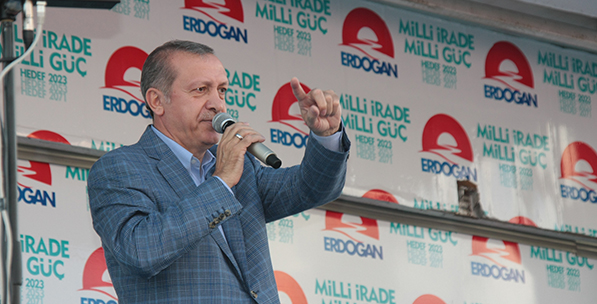Discursive attacks focusing on Turkey's alleged "authoritarian turn" gained momentum following the response of the AK Party government to the violent Gezi protests and politically-motivated judicial operations after Dec. 17 last year. The artificial debate on authoritarianism should be taken seriously as it could potentially undermine some of Turkey's political and economic gains over the last decade via a perceptive operation. The relationship between democracy and development is more sophisticated than it seems at first glance. These concepts have different definitions, formulations and standards. As a result of debates abound concerning the binary opposition of democratization/authoritarianism, or development/underdevelopment. The democracy/development dilemma is crucial for developing countries and emerging powers in the global system, as they are expected to pursue political and economic reforms simultaneously.
The main problem centers on whether to give priority to the advancement of physical modernization and socio-economic development, or the progress of democratic consolidation through legal and institutional reforms. In more stable geo-political and geo-economic settings, "virtuous circles" emerge whereby openings for democratic consolidation stimulate socio-economic development and vice-versa. Turkey's rapid democratization and development experience between 2005 and 2010 constitutes a clear case in point. However, developing countries are often open to international interventions as they are located in geopolitical, ethnic and religious conflict zones. That is why, especially during times of domestic and regional turbulence, "strong administration," stability and predictability becomes public priority and democratization reforms might slow down. In this context, the relative decline in the pace of reforms in Turkey after 2011 should be attributed to the mixture of domestic and regional turbulence stemming from the Gezi-like movements, Arab Spring and the rise of ultra-nationalism in the EU, rather than the alleged rise of authoritarian tendencies.
From another angle, developing countries have pressing needs for investments in infrastructure, improvements in public services and management of sustainable growth. Effective realization of these requires swift decision making and implementation, rather than the usual democratic wrangling in industrialized societies. One aspect of the recent debate on the alleged "authoritarian turn" in Turkey is related to this "speed" element in the formulation of critical decisions. But Prime Minister Recep Tayyip Erdoğan pursues a dynamic political strategy based on what he calls "service politics" based on fast decision-making and implementation on key projects that could improve the standards of living, physical infrastructure and public services. In fact, the AK Party as a political movement owed much of its success to the speed through which it was able to rehabilitate the economy and perform a physical and institutional modernization across the country. Therefore, the prime minister's passionate calls for the preservation of the developmental momentum against obstacles shall be conceived as a reflection of his attachment to the success of the transformation project, rather than as acts of pseudo-authoritarianism. These calls could be expected to become even stronger following the probable election of Erdoğan as Turkey's next President.
AK Party governments spearheaded most of the critical reforms expanding the rights of most disadvantaged groups such as devout Muslims, ethnic Kurds and religious minorities in Turkish society. The pace of democratization reforms will likely increase again and catch up with the development drive, once the election season is over.
[Daily Sabah, July 12, 2014]








